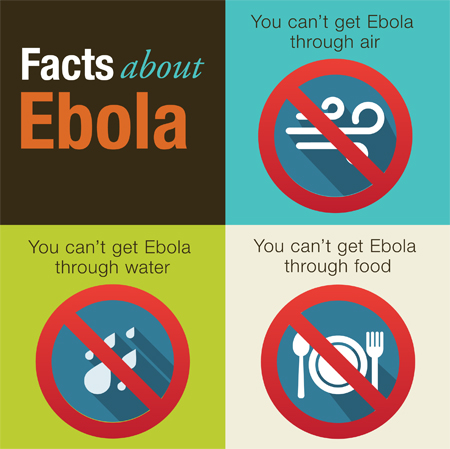Volunteering in the ER: What about Ebola?

Normally I dread mandatory meetings for Volunteers, but I actually was a little curious when we went to one about Ebola. Volunteering in the ER is a little scary when you think about it. Volunteers are often the first to come in contact with Patients as they walk through the door. We’re like the “first responders!” I mean I’d like to be a famous actor, but not because I’ve caught Ebola, yikes!
How in the world are we supposed to know if someone has the flu or food poisoning or Ebola? Early symptoms are the same: weakness, fatigue, abdominal pain, nausea, vomiting.
Separating Facts from Fiction —

learn the facts
Charlayne says transmission occurs only through direct contact with blood or bodily fluids of patients who are ill from Ebola – or contact with needles or syringes that’ve been exposed. But what if someone sneezes on you? Does that count? Or what if you sit on a toilet seat that’s a little wet but you don’t know it till it’s too late?
Fear of the Unknown —
Niles says that the panic over Ebola reminds him of the paranoia around Aids in the early 80s when people were dying, but no one knew how you could catch it. That was before they knew about infected blood transfusions and all of the hows-and-whys of sexual transmission – so scary. Not-knowing is almost the hardest part.
Now people are really freaking out about Ebola — and with good reason (Did you see Contagion?) Imagine being on the flight where a coughing-hacking-guy announces to passengers, “I’ve got Ebola, you’re all screwed!” Imagine having someone take your temperature at JFK, or O’Hare, or Dulles Airport and then command you to, “Please come this way…”
Helping Patients with Ebola —
We’d all like to just live in our own bubble, but — if you have a family member or friend who’s exposed to Ebola, don’t you want to get him/her to a major hospital STAT? Wouldn’t you want to help? What if you were exposed? Wouldn’t you want someone to help you?
In our meeting they basically told us to “Purell” constantly + protect ourselves with gowns, gloves, face shield, mask, booties, shoe covers, leg covers if we “come in contact” – but the bigger question is: “How do you know when you’re coming in contact?” How can you help those who need it, if you have to put yourself at risk?
It’s a medical conundrum for sure. Lots of questions, no answers…